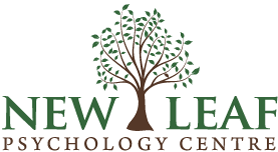Psychological Assessments
 New Leaf Psychology offers a variety of psychological assessments.
New Leaf Psychology offers a variety of psychological assessments.
Psychoeducational Assessments
Psychoeducational assessments are used to better understand an individual’s intellectual and problem solving abilities (e.g. IQ), executive functioning abilities (e.g. memory, attention, task approach), academic skill (e.g. reading, writing, spelling, math), and emotional functioning (e.g. anxiety, depression, acting out behaviour) for the purpose of providing recommendations to improve academic programing and performance. Psychoeducational assessments are individualized and can identify academic strengths and weaknesses, learning disabilities, attention deficit-hyperactivity disorder, emotional and behavioral difficulties, and intellectual development or delay.
Most psychoeducational assessments include an interview with parents, interview with the child/youth, approximately 5 hours of testing, questionnaires completed by multiple sources (e.g. parents, caregivers, and teachers), feedback, and a written report. Recommendations are provided at the feedback session and are included in the final report. A total of 3 to 5 sessions are required, depending on the age of the individual assessed, and the nature of the presenting concerns.
Giftedness Testing
Giftedness testing is used to determine whether or not a child or youth’s intellectual ability (IQ) is in the range that would allow them to qualify for access to educational programs dedicated to students who are considered gifted. Giftedness testing is not as involved as a psychoeducational assessment, as it only considers intellectual ability, and thus cannot determine the presence of learning disabilities.
Autism or Developmental Assessments
Research has shown that the younger a child is when treatment for an Autism Spectrum Disorder begins, the more likely that treatment is to be effective and if treatment is effective, the greater the gains will be. Thus, early assessment and diagnosis of Autism Spectrum Disorders is an important first step to secure early and effective interventions. See the Autism Society of Canada’s website for more information.
Autism assessments completed at New Leaf Psychology Centre are comprehensive, involving parent interviews, observation of the child, administration of autism specific assessment tools (e.g. ADOS) and, depending on the age of the child, a full psychoeducational assessment (including consideration of intellect, executive functioning, academic skills, and adaptive functioning). Recommendations are provided at the feedback session and are included in the final report. A total of 3 to 5 sessions are required, depending on the age and symptoms of the individual assessed.
Diagnostic Assessments
Diagnostic assessments are conducted in order to determine the presence of a mental health diagnosis and provide treatment recommendations. Most diagnostic assessments include a two to three hour diagnostic interview, completion of questionnaires, review of medical records, consultation with other care providers (e.g. physician, occupational therapist), feedback, and a written report. Information collected during the interview typically includes the history of any mental health symptoms and personality attributes, relationship history (e.g. family of origin, social relationships), work history, and medical history. Diagnostic assessments are typically conducted at the request of an insurance provider or a physician/psychiatrist seeking a second opinion.
Note: Consent is required from both parents when a child is assessed. Reports are given to parents and adult students who can decide how to distribute the report (e.g. school, family physician).
Note: If applicable, assessment reports contain a diagnostic statement. These statements are often necessary as one of the criteria required by the school board’s IPRC committees in attaining access to specialized education programs.
